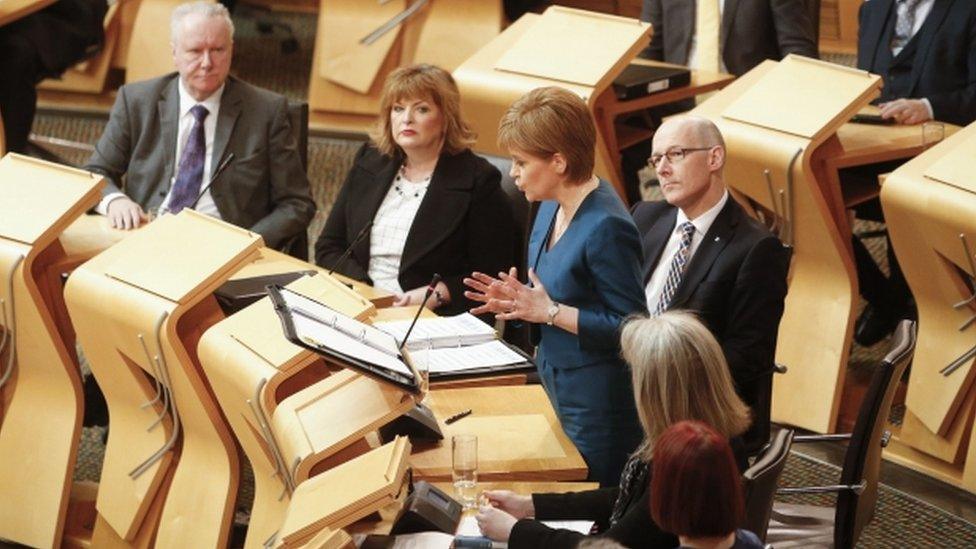Devolution committee recommends Scotland Bill approval
- Published

Holyrood will debate and vote on the Scotland Bill next week
MSPs should give their backing to the Scotland Bill when they debate it next week, Holyrood's devolution committee, external has recommended.
The UK government legislation will hand greater control over areas including income tax, VAT and welfare to the Scottish Parliament.
But it needs the consent of the Scottish Parliament before it can become law.
MSPs will decide whether to give their approval to the bill next Wednesday.
A vote in favour will allow the legislation to continue its passage through Westminster, with the new powers expected to come into force next year.
Smith Commission
The devolution committee said the bill had been improved through a series of amendments which had been agreed to by Scottish Secretary David Mundell.
But it said there were still some areas where it felt it continued to fall short of the "spirit and substance" of the Smith Commission devolution settlement that was drawn up in the wake of the independence referendum.
Despite these misgivings, committee convenor Bruce Crawford said it had agreed unanimously to recommend that Holyrood gives its legislative consent to the bill.


The Scotland Bill will hand a raft of new powers to the Scottish government
What powers are being devolved under the Scotland Bill?
The permanence of the Scottish Parliament is recognised, with a referendum needed in order to abolish it
The bill will also devolve powers to set the rates and bands of income tax on non-savings and non-dividend income
A share of VAT receipts in Scotland will be assigned to the Scottish government's budget
Powers over certain aspects of welfare and housing related benefits, including DLA/PIP, Attendance Allowance, Carers Allowance and others will be devolved
The bill will devolve Air Passenger Duty and Aggregates Levy; powers over speed limits and road signs, and rail franchising;
Control of the functions of the British Transport Police, Ofcom and the management of the Crown Estate relating to Scotland will also be devolved
The Scottish Parliament will be given powers over abortion laws and welfare foods (for example, milk and infant formula for pregnant women and children under 5 years of age in low-income families),
Holyrood will take control of its electoral system, subject to a two-thirds majority within the parliament for any proposed change
The bill and documents relating to it can be read in full here, external

Mr Crawford, an SNP MSP, said the move would mark a "significant milestone in a remarkable political process".
He added: "There are still some areas where we feel the Scotland Bill continues to fall short of the spirit and substance of Smith, notably in relation to the devolution of employment programmes and the future operation of the legislative consent provision.
"Nevertheless, the bill has been improved during its passage through our detailed scrutiny, and we welcome the fact that the Secretary of State for Scotland listened to our arguments - most notably on enshrining in the bill the need for a referendum of the Scottish people on any proposal ever to abolish the Scottish Parliament."
Mr Crawford said the Scottish Parliament would have a "big job to do" in scrutinising the legislation that will flow from the new powers it will have.
The Scottish government had threatened to veto the Scotland Bill unless a "fair" agreement on the funding deal that accompanied it was reached, but a last-minute deal was struck last month.
'Detrimental impact'
At the time, First Minister Nicola Sturgeon told MSPs: "There is now an agreement in principle that we can recommend to parliament."
The committee said the delays in reaching a deal had a "detrimental impact" on the level of scrutiny it has been able to undertake.
But its report stated: "Nevertheless, on the basis of the information provided to date by the two governments, the committee welcomes the agreed fiscal framework and we are prepared to endorse its key provisions."
The committee also highlighted its disappointment that all key documents relating to the fiscal framework deal had not been published after the move was blocked by the Treasury.
And it said it was concerned about the lack of detail in the public domain on what would happens at the end of the five-year fiscal framework deal if both governments do not agree on the next steps.
- Published23 February 2016

- Published23 February 2016